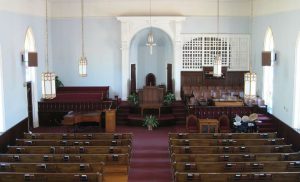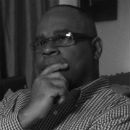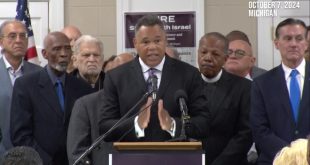 There is a movement afoot, particularly within black evangelical circles, to extol, if not exalt, social justice as the raison d’etre, that is, the most important reason and purpose, of the church today.
There is a movement afoot, particularly within black evangelical circles, to extol, if not exalt, social justice as the raison d’etre, that is, the most important reason and purpose, of the church today.
I say “particularly” because the aforementioned movement is not restricted only to the realm of black evangelicalism. The truth is there are also certain elements within white evangelicalism which, being motivated to a large extent by a collective acquiescence to the idea of “white guilt,” have attached themselves to this movement like a caboose to a locomotive.
The problem with movements, however, is they invariably beget labels (e.g. “social gospel,” “liberation theology,” etc.). And labels tend to subtly, yet ultimately, reorient our focus from that which is of utmost importance, namely, proclaiming the gospel of Jesus Christ to the world, in favor of adopting a socio-cultural “gospel” constructed from a worldview espoused by “woke” theologians and philosophers, who are considered by many to be the most socially and culturally aware on matters of social and liberative justice.
Again, this mindset is not exclusive to black evangelicalism, and yet it is within that milieu that this movement, I believe, is doing the most harm to the Black Church.
I make that statement neither lightly nor disparagingly. I was raised in the Black Church. The affinity I have for its history and traditions is borne not only from education but experience. I appreciate the invaluable sacrifices and contributions to black ecclesiology of figures like Absalom Jones, Morris Brown, Jarena Lee, John Marrant, Betsey Stockton, Henry Garnet, and Richard Allen.
I spent half my life, into my early 20s, as a member of Chapel Hill Missionary Baptist Church, located in Atlanta’s West End in the shadows of such venerable HBCUs as Morehouse, Spelman, Clark-Atlanta, and Morris Brown, where I worshiped alongside many family members and friends to the music of black gospel stalwarts as Walter and Edwin Hawkins. In fact, to this very day, the Hawkins-penned Changed, a powerful testimonial of spiritual redemption in Christ, remains one of my all-time favorite gospel songs.
It was at Chapel Hill that I witnessed people of all ages “catch the Spirit” during high points of what often seemed unending worship services. It was at Chapel Hill that I watched royally accoutered choirs march slowly into the sanctuary to the uplifting refrains of “We Are Soldiers In The Army.” It was at Chapel Hill that I passed those faux gold-plated offering plates – you know the ones – with the red crushed-velvet matting, to congregants sitting next to me in pews that, likewise, were fashioned with red crushed-velvet padding as if to match the aesthetics of the offering plates.
It was at that small church on Northside Drive that, Sunday after Sunday, I listened to the verbum Dei, the Word of God, preached – from the King James version of course – from behind an old wooden lectern with the letters “IHS” engraved on the front. And it was at Chapel Hill Missionary Baptist Church that “the doors of the church” were always open, inviting sinners like me to step out from those crushed-velvet cushioned pews, walk that red-carpeted aisle, sit down in the lone wooden chair placed front-and-center of the sanctuary by a white-gloved deacon or deaconess, and “get saved” as it were.
All this to say that there is nothing about the so-called “Black Church experience” to which I cannot personally relate. Which is why, though I am Reformed – and, thankfully, Reformed theology is slowly but steadily gaining exposure within contemporary black evangelicalism – there will always be a place in my heart for the Black Church and, likewise, an equally heartfelt desire to see a recovery of biblical orthodoxy as its primary raison d’etre.
But, alas, I find what many term “social gospel” to be somewhat prohibitive to that end in that it relegates the central message of the gospel, namely, deliverance from the spiritual bondage of sin through faith in the propitiatory and substitutionary atonement of Jesus Christ as secondary to a temporal “deliverance” defined primarily in terms of the socio-economic empowerment of black people (also known as “black power“) and the embracement and affirmation, particularly by white people, of black cultural normativity.
It is an ideology that is more anthropocentric (man-centered) than theocentric (God-centered). As Dr. James H. Cone, whom many regard as the founder of black liberation theology, explains:
“Black Theology is a theology of black liberation. It seeks to plumb the black condition in the light of God’s revelation in Jesus Christ, so that the black community can see that the gospel is commensurate with the achievement of black humanity. Black Theology is a theology of “blackness”. It is the affirmation of black community that emancipates black people from white racism, thus providing authentic freedom for both white and black people. It affirms the humanity of white people in that it says no to the encroachment of white oppression.” – Black Theology: A Documentary History, Volume 1: 1966-1979
Having defined black theology, Cone, in another of his writings, outlines how the Church must apply that construct in bringing about the emancipation he envisions for black people. He declares that:
“The Church cannot remain aloof from the world because Christ is in the world. Theology, then, if it is to serve the need of the Church must become “worldly theology”. This means that it must make sure that the Church is in the world and that its word and deed are harmonious with Jesus Christ. It must make sure that the Church’s language about God is relevant to every new generation and its problems. It is for this reason that the definitive theological treatise can never be written. Every generation has its own problems, as does every nation. Theology is not, then, an intellectual exercise but a worldly risk.”– Black Theology & Black Power: The White Church and Black Power, p. 84
There is much within the orthodoxy and orthopraxy of James Cone with which I disagree. Not that what I think matters to him or anyone else. Nonetheless, there is a degree of dualism in Cone that seems to suggest the belief that the gospel is both sufficient and insufficient at the same time.
Given the extent to which Christianity was leveraged by white people to oppress black people, one would think Cone would argue for a new religion altogether, one whose doctrine would inherently provide greater potential to achieve his stated goal of black liberation completely independent of the cooperation of white people. Or, if not that, then, perhaps an existing one would suffice in making up for what Christianity somehow lacks in effectuating the kind of social change Cone, and those who might share his worldview, seek.
But if the gospel isn’t sufficient for all of life, the question then becomes: why believe the gospel at all? If Christianity is to be understood merely as a moralistic prescriptive for the social ills of people who are of a particular ethnicity, or of the world at large, then, what is there to distinguish it from Islamism, Taoism, Confucianism, Buddhism, Judaism, Hinduism, or any other “ism” that holds as one of its core tenets the equitable treatment of one’s fellow human beings?
“The black man’s response to God’s act in Christ must be different from the white man’s because his life experiences are different.” – James H. Cone, Black Theology & Black Power
The problem with “woke theology” is it emphasizes a teleology of Christianity that is one-dimensional. It does this by reducing Christianity to what Cone described as “worldly theology”. In other words, a theology whose primary raison d’etre has less to do with the spiritual redemption of a sinful people, that is, the world entire, and more with the corporeal redemption of a particular ethnic people, to whom salvation is viewed in terms of, as Cone stated, “the affirmation of black community that emancipates black people from white racism.”
A recurring thought in the black theology of James Cone is Jesus as the divine “liberator” of black people from the scourge of white oppression. It is a view which, in my mind, begs the question: why does Cone see the God of Christianity – Jesus Christ – as this great liberator and not Allah? Or the Hindu triumvirate of Brahma, Vishnu, and Shiva? Or the Buddha? Or any other religious deity? The answer is simple, really. It is because only the gospel of Christ deals with that which gives rise to oppression to begin with – our sin.
“Some folks good no matter what dey color, other folks bad.” – Cal Woods, freed slave (freedman)
Regardless by what label we choose to call it – “black theology,” “social gospel,” “social justice,” “liberation theology” – any so-called “gospel” that proposes to solve or redress the injustices human beings inflict upon one another apart from addressing the root cause of those injustices is short-sighted, naive, and doomed to fail.
Above all else, the gospel of Christ is a theology that deals with the reality of the human condition (Gen. 8:21; Rom. 3:23). It is a condition which John Calvin, in his Institutes of the Christian Religion, describes as “a hereditary corruption and perversion of our nature, which in the first place renders us guilty of God’s wrath, and in the second produces in us those works which Scripture calls ‘works of the flesh’ (Gal. 5:19-21).”
A “woke theology” that is devoid of hamartiology is weak theology.
For in whatever sense Jesus may be viewed as a “liberator” of His people, it is first and foremost as the One who, by His propitiatory death on the cross, liberates us from our bondage to sin (Rom. 6:10; 1 Jn. 3:5). It is this spiritual liberation that the Black Church – and the Church universal – must again commit itself to preach. For it is only in Christ that we find freedom from the sin that leads to oppression of every kind (Mk. 7:17-23).
“In all likelihood the revival we crave and need will come at a time we least expect through a means we too often neglect: the simple though diligent application of the Word of God to all of life.” – Thabiti Anyabwile, Reviving the Black Church: A Call To Reclaim A Sacred Institution
Now, lest I be misunderstood, none of this has been to suggest that the Church should not be involved in practical ways in advocating for social change that is rooted in the biblical precept of imago Dei (Acts 17:26). Nevertheless, we must never lose sight of the fact that as much as the gospel of Christ is about life in this world, it is also about life in the next (1 Jn. 5:11-12).
A salvation that is temporal but not eternal is not true salvation (Mk. 8:36).
It is in light of this reality that I am reminded of the account of a black woman, a teacher, by the name of Eliza Davis George. History records that on February 2, 1911, during the morning devotional hour at Central Texas College in Waco where Ms. George taught, she had a vision of black Africans passing before the Judgment Seat of Christ. Weeping and moaning as they passed, many of them were saying to Him, “No one ever told us You died for us.”
Stay woke.
Photo credit: By Ronzoni at English Wikipedia, CC BY-SA 3.0, Wikimedia Commons
 Darrell B. Harrison is a Reformed Baptist, theologian, U.S. Army veteran, and blogger. He blogs at JustThinking.me.
Darrell B. Harrison is a Reformed Baptist, theologian, U.S. Army veteran, and blogger. He blogs at JustThinking.me.
The views expressed in opinion articles are solely those of the author and are not necessarily either shared or endorsed by Black Community News.
 CURE News and Clergy Blog News and Commentary for Christians
CURE News and Clergy Blog News and Commentary for Christians




The sole purpose of any church is to worship the Creator from the Declaration of Independence.
Any thing else is a hood ornament on a car, made by man and going nowhere.